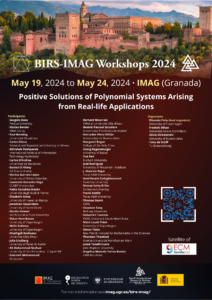Event Details
May 19-24, 2024
The Institute of Mathematics at the University of Granada will host the "Positive Solutions of Polynomial Systems Arising from Real-life Applications" workshop at the University of Granada (IMAG) in Spain, from May 19 - 24, 2024.
Models in the sciences and engineering are frequently expressed as solution sets to systems of polynomial equations. This is a basic notion in algebraic geometry, a vibrant key area of mathematics which is particularly good at counting, giving structure to interesting sets and, principally, understanding structure. The study of these models has benefited from the development of computer algebra systems over the last decades, making theoretical results applicable in real scenarios such as biology, computer science, physics, chemistry, etc.
However, models of reality are often concerned with real solutions, or even positive real solutions, the defining polynomials are typically parametric, and the number of variables and parameters is often very large. This poses new challenges to the field of (real) algebraic geometry, which existing techniques fall short to overcome. The goal of the workshop is to bring together researchers with expertise in real algebraic geometry and the applications to facilitate the exchange of knowledge and ideas. With this we aim at discovering and starting new directions to solve the real-world problems, as well as new theories to be developed within mathematics.
ONLINE ATTENDANCE
The talks of this workshop will be broadcast via Google Meet, and they can be followed at
https://meet.google.com/aqs-erng-avu
SCHEDULE
Further details, including abstracts of the talks, can be found on the BIRS website.
Organizers
- Elisenda Feliu (University of Copenhagen)
- Frederic Bihan (Université Savoie Mont Blanc)
- Timo de Wolff (TU Braunschweig)
- Alicia Dickenstein (University of Buenos Aires)
CONFIRMED PARTICIPANTS
- Saugata Basu (Pordue University)
- Matías Bender (INRIA Saclay)
- Paul Breiding (Universität Osnabrück)
- Carles Checa (National and Kapodistrian University of Athens)
- Abhishek Deshpande (International Institute of Information Technology Hyderabad)
- Carlos D’Andrea (Universitat de Barcelona)
- Boulos El Hilany (TU Braunschweig)
- Marina Garrote López (University of British Columbia)
- Laureano Gonzalez-Vega (CUNEF Universidad)
- Pablo González-Mazón (Università degli Studi di Trento)
- Elizabeth Gross (University of Hawaii at Manoa)
- Jonathan Hauenstein (University of Notre Dame)
- Martin Helmer (North Carolina State University)
- Oskar Henriksson (University of Copenhagen)
- Nidhi Kaihnsa (University of Copenhagen)
- Khazhgali Kozhasov (Université Côte d’Azur)
- Julia Lindberg (University of Texas At Austin)
- Ali Mohammad Nezhad (University of North Carolina - Chapel Hill)
- Fatemeh Mohammadi (KU Leuven)
- Bernard Mourrain (INRIA at Université Côte d’Azur)
- Beatriz Pascual Escudero (Universidad Politécnica de Madrid)
- Mercedes Pérez Millán (Universidad de Buenos Aires)
- Margaret Regan (College of the Holy Cross)
- Georg Regensburger (University of Kassel)
- Yue Ren (Durham University)
- José Rodriguez (University of Wisconsin - Madison)
- J. Maurice Rojas (Texas A&M Univeristy)
- AmirHosein Sadeghimanesh (Coventry University)
- Mohab Safey El Din (Sorbonne University)
- Frank Sottile (Texas A&M University)
- Thomas Sturm (CNRS)
- Xiaoxian TanG (Beihang University)
- Sebastien Tavenas (CNRS, Université Savoie Mont Blanc)
- Máté László Telek (University of Copenhagen)
- Simon Telen (Max Planck Institute for Mathematics in the Sciences)
- Thorsten Theoblad (Goethe-Universität Frankfurt am Main)
- Josué Tonelli-Cueto (John Hopkins University)
- Angelica Marcela Torres Bustos (CRM Barcelona)
- Pedro A. García (University of Granada)
- Ruth Idalia Oliva (University of Granada)


